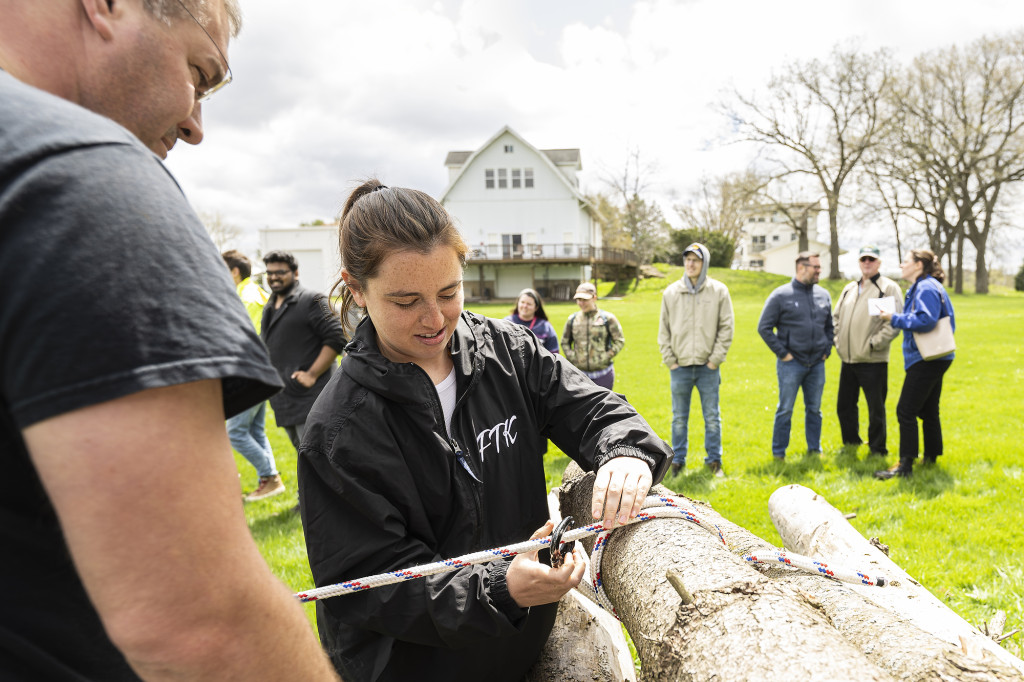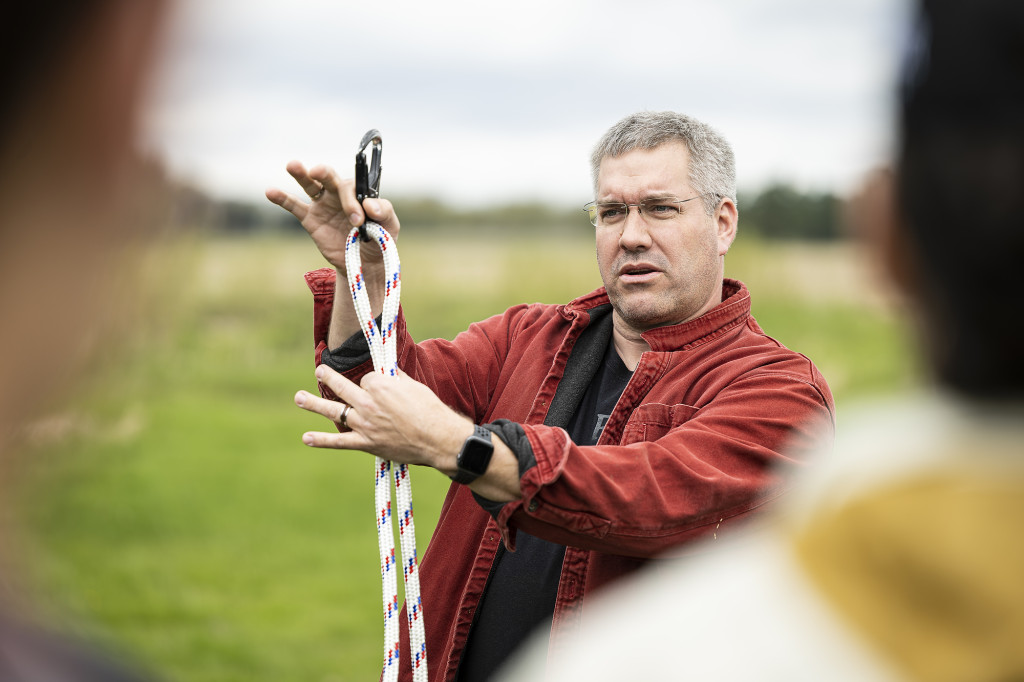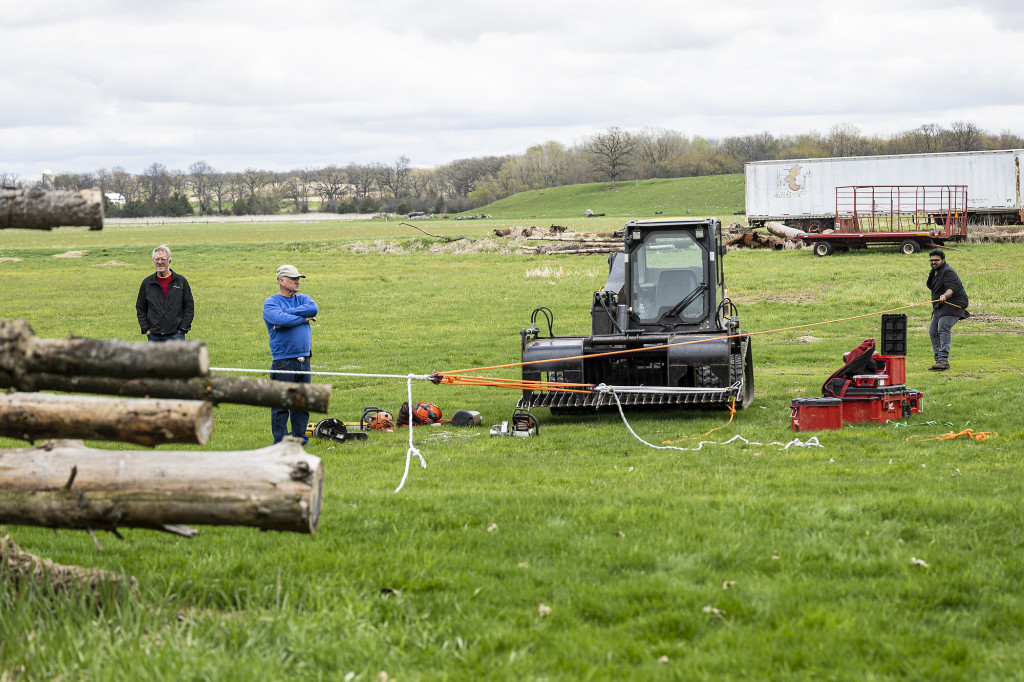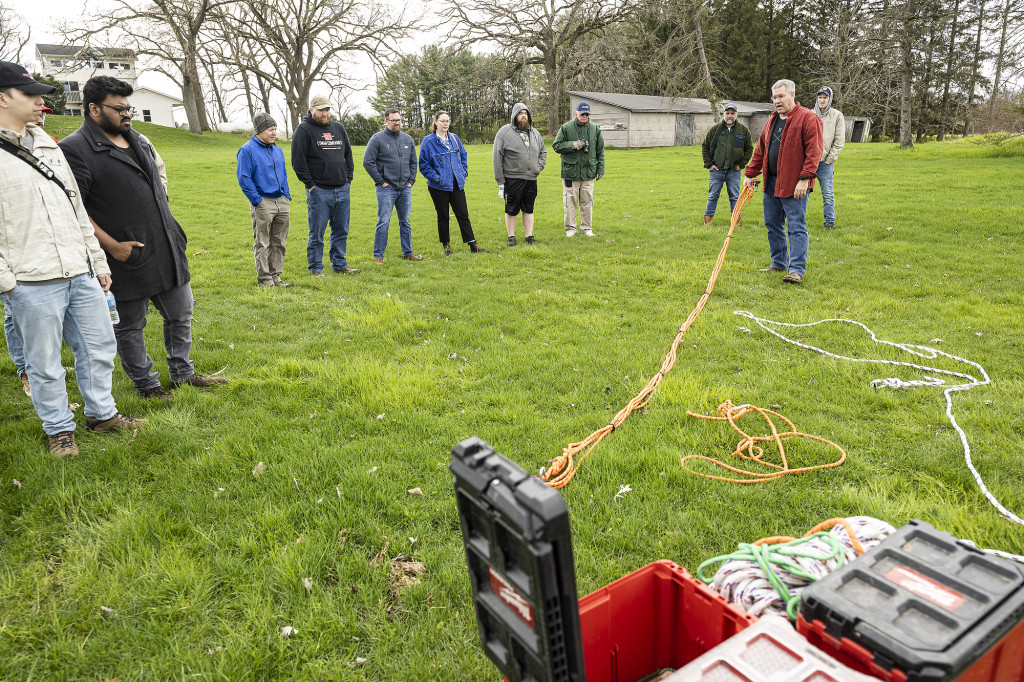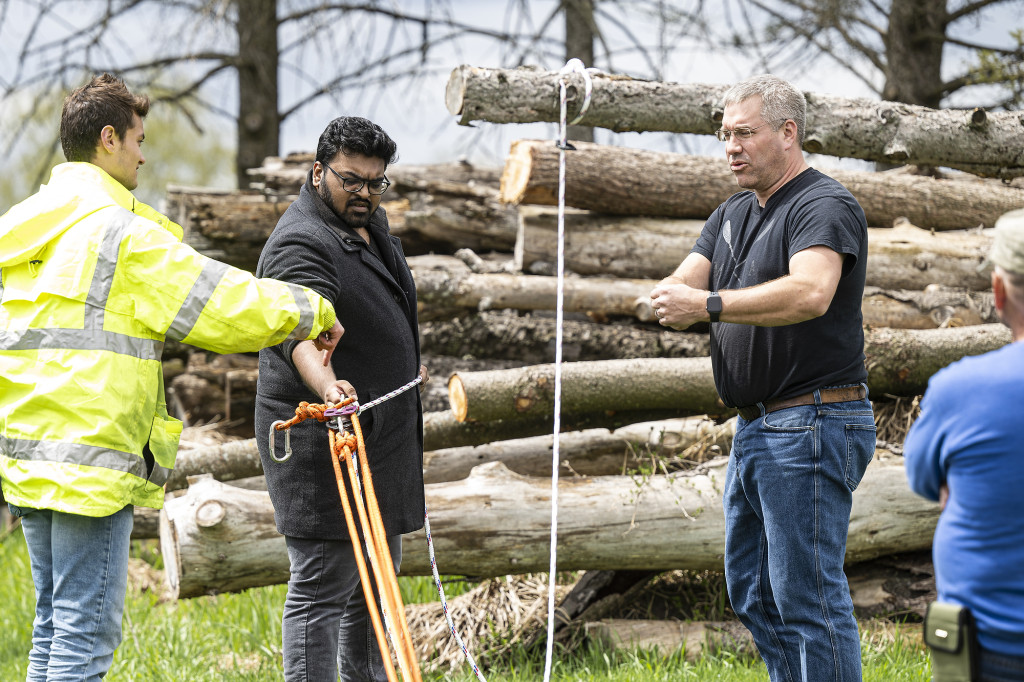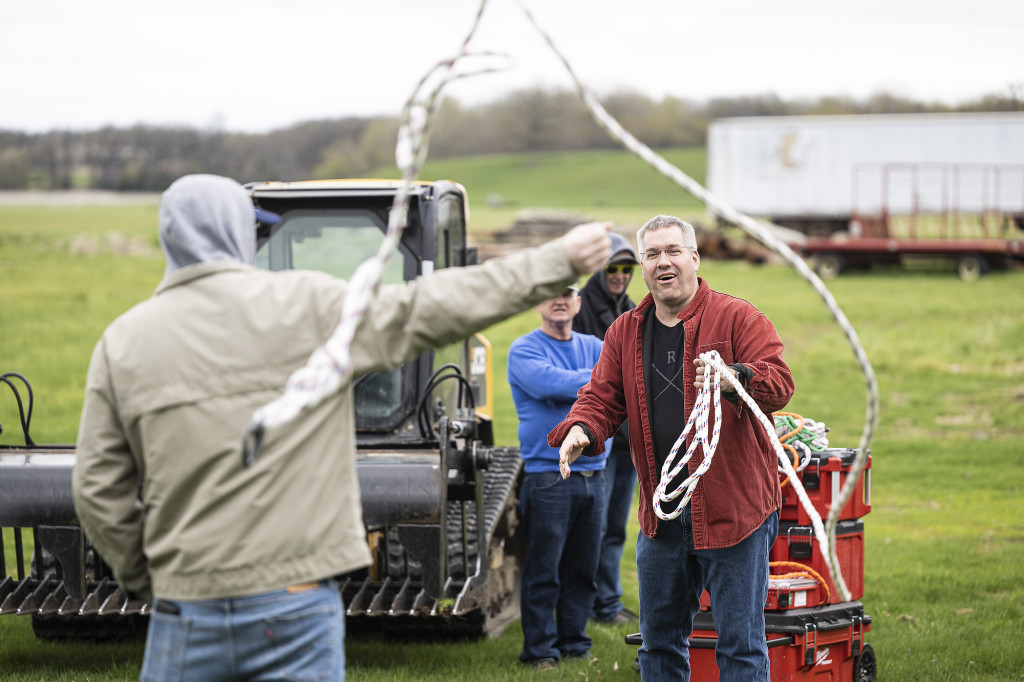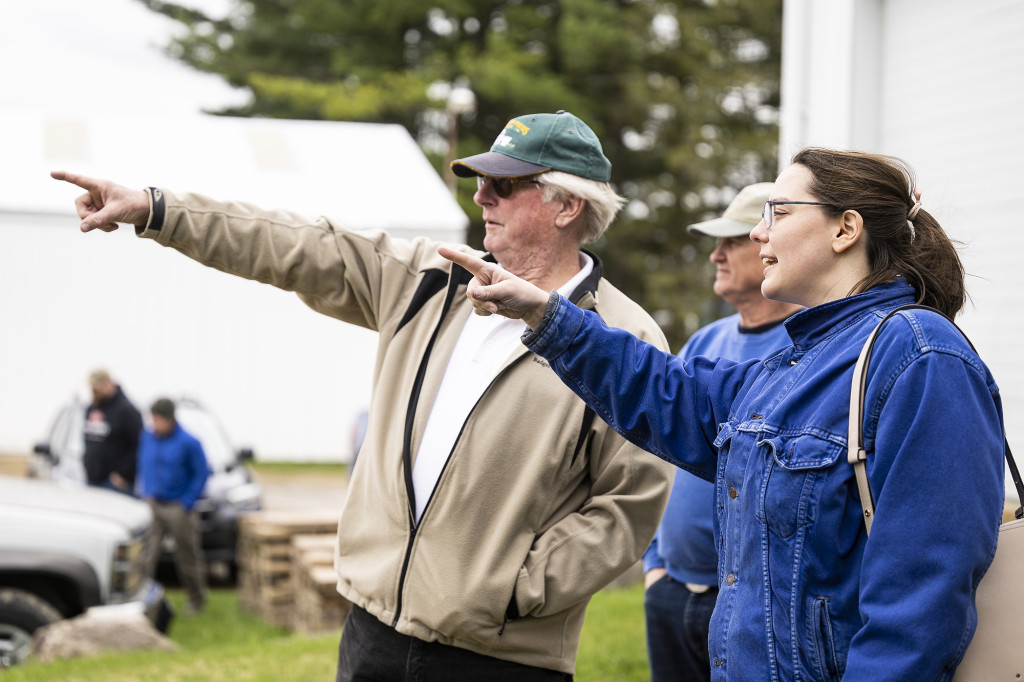Water resources students get hands-on experience with creek cleanup
DEERFIELD — Determined to remove a log from a large pile, several Nelson Institute Water Resources Management students leaned into their ropes in a field at Badger Farms.
“You don’t think that just tying a rope around the log and yanking on it is going to do much, especially for me that’s barely over five feet tall,” said Hannah Agner, a Water Resources Management (WRM) student.
But the log slowly creaked its way out of the stack and was met with cheers when it finally broke free.
With the guidance of experienced water trail volunteers involved in Capitol Water Trails, Maunesha River Alliance, and Friends of Koshkonong Creek, the students were practicing different strategies that can be used to clear blocked waterways during a Wisconsin Water Trail Development 101 seminar on April 29.
“They’ve come up with a pretty unique and interesting method of removing stream obstructions, so it was interesting to be able to pull on that and actually move the log out of it using the techniques that they’ve developed,” Agner said.
This was also the WRM students’ first time seeing the land they had been researching for the past semester.
“Because we’ve just been studying this creek, we haven’t actually gotten to go out and do any type of field work,” WRM student Colleen Dickey said. “To actually be here is very motivating. It’s giving me the bigger picture that I need.”
During their two-year graduate program, the students are partnering with the Friends of Koshkonong Creek and Badger Farms through UniverCity Year (UCY), which is the hallmark program of UniverCity Alliance (UCA).
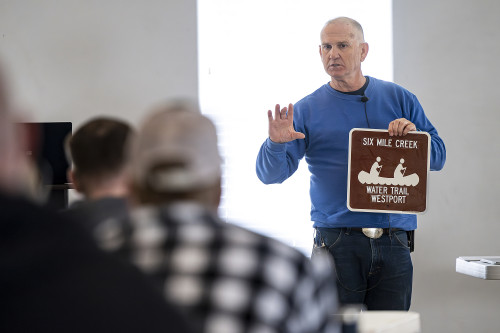
Steve Falter, founder of Capitol Water Trails, speaks to students and others at the Koshkonong Creek Watershed event. Photo: Bryce Richter
From 2021 to 2024, a collaborative that includes the city of Sun Prairie, towns of Deerfield and Cottage Grove, and Friends of Koshkonong Creek with support from Badger Farms partnered with UCY to work toward a healthier Koshkonong Creek to improve water quality and support a variety of wildlife and human activities for generations to come.
“As an ambassador of UW–Madison, we don’t think we know all the answers,” said UCA Managing Director Gavin Luter, addressing the community members who attended the event. “We want to learn from you as the experts on Koshkonong Creek.”
The April 29 event drew participants from the community, including nearby property owners, nonprofit volunteers, and interested residents. UW–Madison Planning and Landscape Architecture Professor and Extension Statewide Specialist Ken Genskow and Ed Boswell, a teaching faculty member in GIS and geodesign, participated in the event.
Prior to the demonstrations, the audience heard from Capitol Water Trails’ Steve Falter on best practices for clearing waterways, safety tips, and rights of water users and land owners.
Genskow and PhD student Andrew Hillman shared the results of a study exploring governance options for the Koshkonong Creek Watershed, which resulted from a class taught by Genskow called “Water Resources, Institutions, and Policies.”
Genskow said the students have benefited from hearing directly from individuals and organizations who care about improving the quality of the creek, public access to it, and recreational opportunities on the waterway.
“As an instructor, it’s helpful to have real, unresolved challenges that emphasize the lessons discussed in class and published literature,” Genskow said. “Projects like this one help keep our educational experiences grounded and raise all sorts of applied research questions for the university to explore in partnership with community members.”
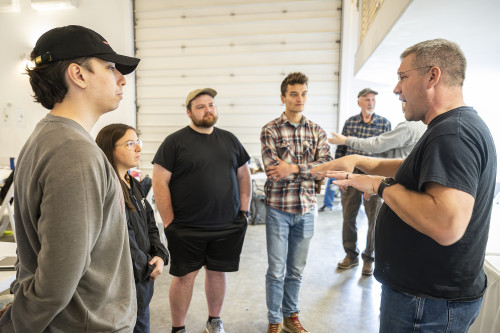
Terry Bradshaw (right), president of the Menasha River Alliance, talks with UW students. Photo: Bryce Richter
Boswell showed participants how to use an interactive website to report situations, like downed trees or other blockages, along the creek. These projects align with the Department of Planning and Landscape Architecture’s Geodesign Collaborative that aims to provide digital tools to engage stakeholders and assist communities with planning and design challenges.
Boswell said the event fostered interaction between the students and community partners with varying interests, from landowners that want to recover flooded farmland and people interested in developing innovative watershed governance structures. He’s already seeing the students’ appreciation for these different perspectives reflected in group discussions.
“Students choose programs like the MS in Water Resources Management at UW–Madison because they want to make a difference,” Boswell said. “Community-based projects provide amazing opportunities for students to apply their skill sets and interests toward solving complex problems while developing empathy for diverse stakeholder perspectives.”
Agner said making those connections was the most important part of the event.
“That can really help us in the early stages figure out where we want to take this project and what could actually be of use to them rather than just us writing a report that’s going to get dusty on the shelf,” Agner said.
This summer, the WRM students will be conducting field work, communicating with neighbors about the issues affecting Koshkonong Creek, and investigating the waterway’s hydrology to see how incorporating wetlands might address flooding issues. This research will inform a watershed management plan.
Heidi Putnam, who is pursuing dual master’s degrees in WRM and urban and regional planning, emphasized the importance of gathering information from those closest to the issue.
“You can have the best plan or idea in the world but if you haven’t talked to someone that actually has lived experience in that area, it’s really hard to make that connection, to understand does this validate or invalidate our ideas or opinions about what might work for a place,” Putnam said. “If you aren’t having a direct conversation from the beginning, you’re not going to have a successful project.”
Both Dickey and Putnam have experience with UCY collaborations. While an undergraduate student, Dickey worked on a project addressing water quality in Pepin County. Putnam recently partnered with Polk County during Fall 2022 as part of her urban and regional planning degree.
These experiences provide the opportunity for students to connect with community partners across Wisconsin and put the skills they learn in the classroom into practice. It also reinforces the importance of building relationships.
“Being in community is invaluable,” Dickey said. “You can’t read this online. Being in this space, you learn way more than you can on your own.”

